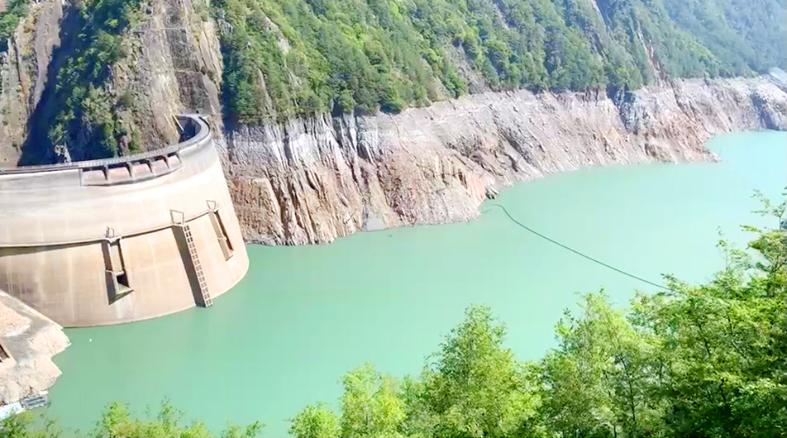Despite a “less than ideal” amount of rain this month, the nation’s manufacturers “remain unaffected” by this year’s drought, Minister of Economic Affairs Wang Mei-hua (王美花) said yesterday.
“It’s true that the weather forecasts for April are not ideal, but by continuing current water restrictions in central Taiwan, there should be enough water until the plum rain season arrives,” Wang said.
Taichung and Miaoli County have been on “red alert” since Tuesday last week, with weekly water supplies to households and businesses on for five days and off for two days.

Photo courtesy of the Taichung Police Department via CNA
Large parts of Taichung’s Deji Reservoir (德基水庫) are nothing but mud due to the lack of rainfall. It is at 4.6 percent capacity.
The Water Resources Agency has said that the reservoir’s water supply is likely to run out in 23 days.
The big question is whether the plum rain season, in May and June, will arrive on schedule and whether there will be the usual amount of rain.
Climate expert Chia Hsin-hsing (賈新興) said the lingering effects of this year’s La Nina could result in a “drier plum rain season.”
“With the lack of typhoons last year, the reservoirs never really filled up properly,” said Chia, general director of Taiwan Sustainable Environmental Engineering Consulting Co (台灣永續環境工程顧問). “We can probably make it to the end of May, but if the plum rain season is not ideal, the consequences could be serious.”
Chia said that the amount of rainfall during this year’s plum rain season was likely to be “on the low side,” but it is too soon to tell what the typhoon season, usually from June to October, would bring.
With the dramatic decline in rainfall over the past year, the Ministry of Economic Affairs has redoubled its efforts to conserve, manage and create new water resources, including by building a pipeline that takes water from Taoyuan to Hsinchu’s industrial parks, home to Taiwan Semiconductor Manufacturing Co (台積電) and other technology companies.
However, preparing for dry years like this should have begun a long time ago, Chia said.
“The reservoirs in Taiwan are old and terribly silted up. We still have irrigation ditches from the Japanese colonial era and the leakage rate from pipelines is high,” he said.
Due to climate change, there is greater “interannual variability,” meaning that while the average rainfall has not changed, Taiwan is experiencing dramatically drier and wetter years, Chia said.
“The clearing of the silt should have started 10 years ago, but at least now the authorities see the problem,” he said. “With good management, the nation should not ... [have] serious drought problems.”
In addition to clearing silt, repairing pipelines and irrigation canals, and rebuilding retention ponds, Taiwan should reforest its mountains to improve rainfall retention, he added.
Water-intensive rice farming is another possible area for reform, Chia said.
“It is true that all our industries, including chipmaking, steelmaking and petrochemicals, are water-intensive, but 70 percent of our water use goes to agriculture,” Chia said.
The Council of Agriculture is exploring new varieties of rice that are more drought-resistant, but it is not yet ready to promote the idea to farmers, who are “used to doing things the old way,” Chia added.

Conflict with Taiwan could leave China with “massive economic disruption, catastrophic military losses, significant social unrest, and devastating sanctions,” a US think tank said in a report released on Monday. The German Marshall Fund released a report titled If China Attacks Taiwan: The Consequences for China of “Minor Conflict” and “Major War” Scenarios. The report details the “massive” economic, military, social and international costs to China in the event of a minor conflict or major war with Taiwan, estimating that the Chinese People’s Liberation Army (PLA) could sustain losses of more than half of its active-duty ground forces, including 100,000 troops. Understanding Chinese

The Ministry of Foreign Affairs (MOFA) yesterday said it is closely monitoring developments in Venezuela, and would continue to cooperate with democratic allies and work together for regional and global security, stability, and prosperity. The remarks came after the US on Saturday launched a series of airstrikes in Venezuela and kidnapped Venezuelan President Nicolas Maduro, who was later flown to New York along with his wife. The pair face US charges related to drug trafficking and alleged cooperation with gangs designated as terrorist organizations. Maduro has denied the allegations. The ministry said that it is closely monitoring the political and economic situation

‘SLICING METHOD’: In the event of a blockade, the China Coast Guard would intercept Taiwanese ships while its navy would seek to deter foreign intervention China’s military drills around Taiwan this week signaled potential strategies to cut the nation off from energy supplies and foreign military assistance, a US think tank report said. The Chinese People’s Liberation Army (PLA) conducted what it called “Justice Mission 2025” exercises from Monday to Tuesday in five maritime zones and airspace around Taiwan, calling them a warning to “Taiwanese independence” forces. In a report released on Wednesday, the Institute for the Study of War said the exercises effectively simulated blocking shipping routes to major port cities, including Kaohsiung, Keelung and Hualien. Taiwan would be highly vulnerable under such a blockade, because it

UNRELENTING: China attempted cyberattacks on Taiwan’s critical infrastructure 2.63 million times per day last year, up from 1.23 million in 2023, the NSB said China’s cyberarmy has long engaged in cyberattacks against Taiwan’s critical infrastructure, employing diverse and evolving tactics, the National Security Bureau (NSB) said yesterday, adding that cyberattacks on critical energy infrastructure last year increased 10-fold compared with the previous year. The NSB yesterday released a report titled Analysis on China’s Cyber Threats to Taiwan’s Critical Infrastructure in 2025, outlining the number of cyberattacks, major tactics and hacker groups. Taiwan’s national intelligence community identified a large number of cybersecurity incidents last year, the bureau said in a statement. China’s cyberarmy last year launched an average of 2.63 million intrusion attempts per day targeting Taiwan’s critical